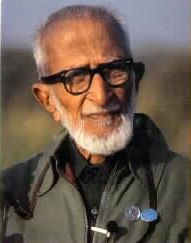|

Dr. Salim Ali, who was also known as the 'Birdman of India' (full name Dr. Salim Moizuddin Abdul Ali)
was the pre-eminent ornithologist in India.( Ornithology is the branch of biology concerned with the scientific study
of birds. It includes observations on the structure and classification of birds, and on their habits, song and flight. )
Orphaned at a young age he was brought up by his Uncle Amiruddin who was a keen Shikari (Hunter) and nature-lover. Under
him a young Salim learned his first lessons in Shikar and became more aware of the nature around him. When he was 10 his Uncle
gave him a air-gun which he then used on a bird. This sparror had a yellow streak and the young Salim wanted more information
on it. The Uncle didn't know anything about it and sent the child to Bombay Natural History Society (BNHS), Mumbai. He went
but, was scared about going in talking with some strange English man (Honorary Secretary, W.S.Millard). He somehow found the
courage and walked in . That single incident changed his whole life and gave India the best ornithologist she had ever known.
Millard told him that it was the yellow-throated sparrow. and showed him their collection of stuffed birds. That one incident
changed his life forever.
Many years of unemployment and struggle was before Salim in his early career If fate had not helped out at the right
time, the famous birdman might have ended up as a disgruntled businessman or office manager. Since there were no jobs connected
with natural history in 1919, Salim Ali and his wife Tehmina went off to Burma to look after the family mining and timber
business. It was a rewarding experience for the naturalist as there were endless opportunities for exploring the forests of
Burma, but the business did not flourish and he had to return to India.
He tried to get a job at ornithologist with the Zoological Survey of India but since he had quit his studies at St. Xavier's
College he didn't get the job. He then decided to increase his knowledge if ornithology as a profession rather than a part
time interest in between office jobs. He left and went to Germany and was lucky Professor Stresemann, an acknowledged ornithologist,
whom Salim Ali considered his Guru taught him. Despite his studies at the prestigious university abroad Salim Ali was unable
to get job. It was then that he hit upon an idea.
There were many great areas of India that were unknown no one had studied or explored them he agreed to do if the state
authorties would fund it and his transport. The states were only to eager to have their birds recorded and readily agreed.
Ali practiced all that he had learned in Germany, the conditions were tough and thought not the greatest they actually
turned out to be the best years of Alis Career. He then began his Nomadic exsistence
The long years that Dr Ali had spent in the field studying birds made him one of those rare Indians who really knew each
and every part of their country, however remote or inaccessible. "My chief interest in bird study has always been its
ecology, its life history under natural conditions and not in a laboratory under a microscope. By travelling to these remote,
uninhabited places, I could study the birds as they lived and behaved in their habitats," he once remarked. Though those
ornithological survey journeys were far from easy bird watching sorties, Salim Ali's wife accompanied him and made camp life
as comfortable as possible in those remote areas. She was not only his wife, but also his script editor, fellow bird watcher
and inspiration. For the next two decades Salim Ali roamed the subcontinent studying birds. There is perhaps no major bird
breeding area on the subcontinent that he hasn't visited.
In 1939 Tehmina died suddenly after minor surgery,of blood poisoning. The couple were living in Dehradun at the time.
This came as a great blow to Salim, he moved from Dehradun back to Bombay permanently. here looked after by his extended family,
Salim Ali continued his study of ornithology.
After India's Independence from the long British rule, Salim Ali took over the BNHS and, managed to save the 200 - year
old institution from closing down due to lack of funds. He wrote to Prime Minister Nehru for help, who immediately came to
the rescue, and gave the society funds to tide over its difficult period.It was the sincerity of conviction that had won him
awards and medals from all over the world. Recognition came late to him but it came abundantly. He received numerous awards
including the J.Paul Getty International Award, the Golden Ark of the International Union for Conservation of Nature, the
golden medal of the British Ornithology Union (A rarity for non-British) and a Padma Shree and Padma Vibhushan from the Indian
Government, 3 honorary Doctorates and numerous other awards. An unlikely parliamentarian, he was nominated to the Rajya Sabha
in 1985. Dr. Ali's experience and knowledge was respected. His timely intervention saved the Bharatpur Bird Sanctuary and
the Silent Valley National Park.
He has written
The Book of Indian Birds,
Pictorial Guide to the Birds of the Indian Subcontinent,
Handbook of the Birds of India and Pakistan (8 volumes) with S. Dillon Ripley.
He also wrote his autobiography 'The Fall of a Sparrow'.
Dr Salim Ali passed away 1987 at the age of 91 he died of prostate cancer. Despite the glory and honor bestowed on him
he always was a young boy at heart with a love and joy for natures birds. Dr. Ali is no more but his legacy lives on.
|



